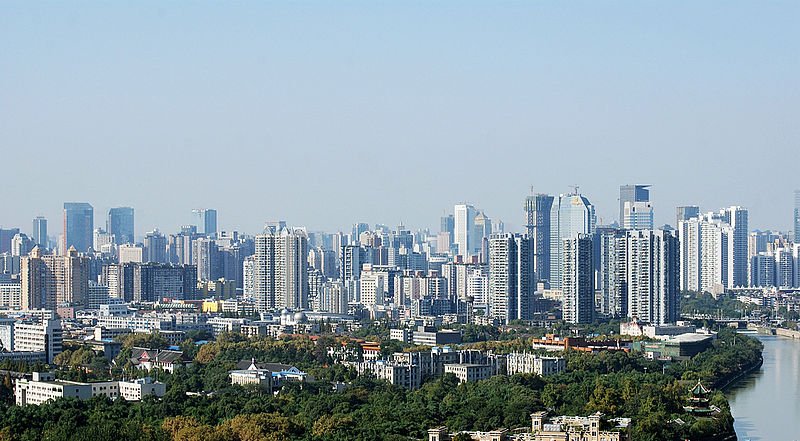 Chengdu, China
Chengdu, ChinaSource: https://commons.wikimedia.org/wiki/File:Chengdu_Skyline.jpg
Author: Cdwaer

Chengdu (成都), also written Ch'eng-tu, is the capital of the Sichuan Province in China. It is a city of 10.5 million people, according to the 2004 estimate, making it the 4th largest city in China after Shanghai, Beijing and Chongqing, and only slightly ahead of fifth-placed Guangzhou. This huge city is the political, cultural and economic nerve centre of southwest China. Chengdu is known in China as the "Brocade City" as well as the "City of Hibiscus".
Chengdu was known as the Brocade City because, during the Western Han Dynasty (206 BC-23 AD), brocade that was produced in Chengdu enjoyed great popularity among the royal and elite class. The emperor put Jin Guan, an official in charge of brocade production, to oversee brocade production in Chengdu. Since then, Chengdu was called "Jin Guan Cheng" or Brocade Official's City), or in its short form, "Jin Cheng" (Brocade city).
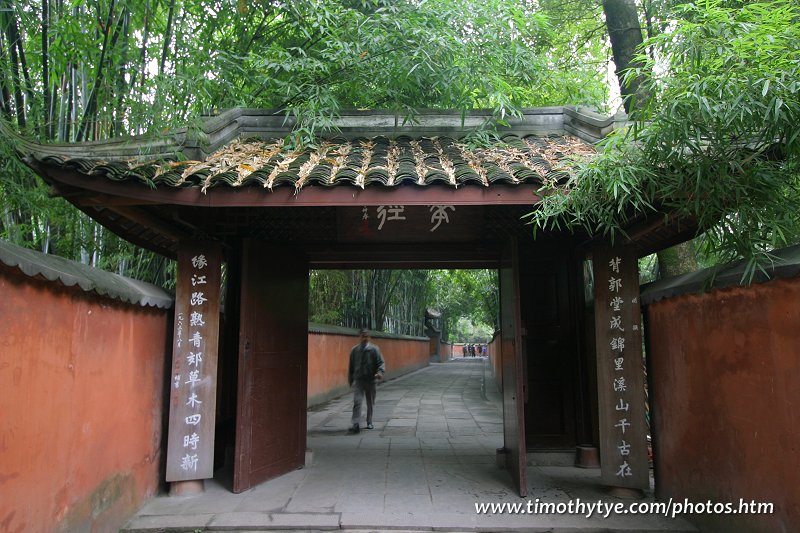 Gateway at Dufu Memorial Museum (20 October 2005)
Gateway at Dufu Memorial Museum (20 October 2005)

During the Five Dynasties and Ten Kingdoms Period (907-960), the king of the Later Shu Kingdom, Mengchang, ordered that hibiscus be planted on the fortress wall around Chengdu. From then on, Chengdu was referred to as the City of Hibiscus. Today the hibiscus is still the city flower of Chengdu. However the last city wall was torn down in the 1960s along with the Royal Palace in the middle of the city.
The people of Chengdu speaks a Southern Mandarin Chinese dialect. This dialect has soft tones, which makes Chinese people outside Chengdu comment that Chengdu people speak like baby girls. On the other hand, the dialect in nearbyt Chongqing sounds rough, and are regarded as the speech of baby boys.
In Chengdu blue skies are as uncommon as blue moons. One is more likely to encounter a sky that is almost always cloudy. The people of Chengdu are also on average shorter. The locals say that they are small because their sky is so low. There is an old saying in Chengdu that "the dogs of Shu bark at the sun" to mean someone who, due to unfamiliarity, reacts strongly to something that is very common.
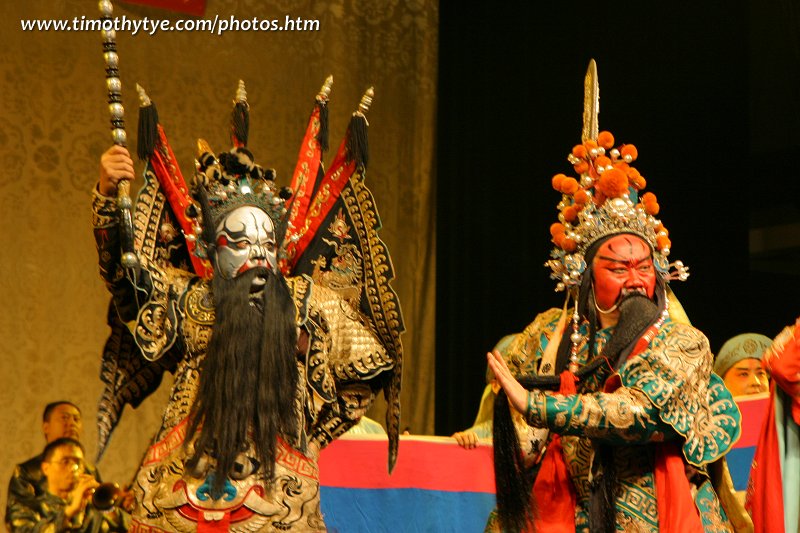 Chengdu Changing Mask Opera
Chengdu Changing Mask Opera
(21 October 2005)

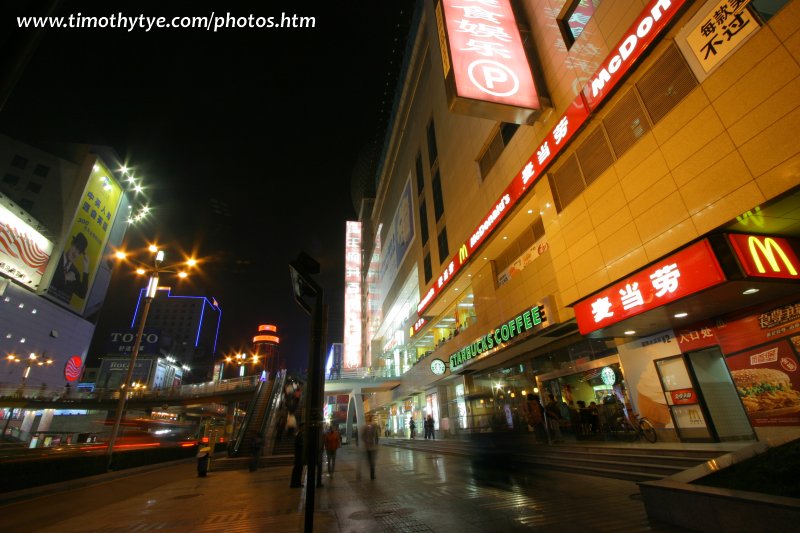 Qiqushan Temple, Mianyang (21 October, 2005)
Qiqushan Temple, Mianyang (21 October, 2005)

In 316 BC, the Shu kingdom was conquered by the Qin and a new city was founded by the Qin general Zhang Yi (who in fact argued against the invasion). This was the beginning of the Qin (which by extension, the Chinese) Chengdu. During the Han Dynasty, it was renamed Yìzhou.
Following the fall of the Western Han Dynasty, around the era of the Three Kingdoms, Liu Bei founded the Southwest kingdom of Shu-Han (220-263) with Chengdu as its capital.
During the Tang Dynasty, master poet Li Bai and Du Fu spent some part of their lives in Chengdu. Du Fu lived in the celebrated Caotang (grass-hut) during the second year of his four-years stay (759-762). Today's Caotang, a rather sumptuous house in the traditional style, is a reconstruction.
During the Northern Song Dynasty, around 960AD, Chengdu was the first place to use paper money for general circulation.
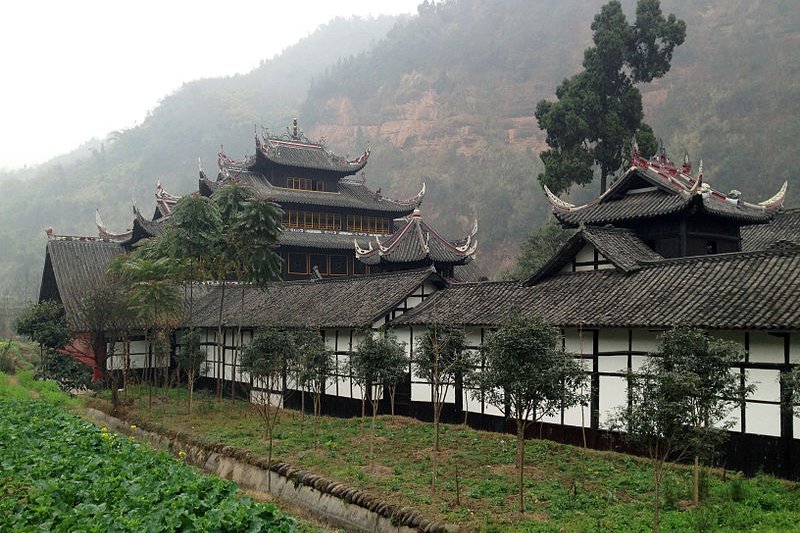 Chuanwang Palace, Xinchang
Chuanwang Palace, Xinchang
Author: Cdwaer

Chengdu (成都), also written Ch'eng-tu, is the capital of the Sichuan Province in China. It is a city of 10.5 million people, according to the 2004 estimate, making it the 4th largest city in China after Shanghai, Beijing and Chongqing, and only slightly ahead of fifth-placed Guangzhou. This huge city is the political, cultural and economic nerve centre of southwest China. Chengdu is known in China as the "Brocade City" as well as the "City of Hibiscus".
Chengdu was known as the Brocade City because, during the Western Han Dynasty (206 BC-23 AD), brocade that was produced in Chengdu enjoyed great popularity among the royal and elite class. The emperor put Jin Guan, an official in charge of brocade production, to oversee brocade production in Chengdu. Since then, Chengdu was called "Jin Guan Cheng" or Brocade Official's City), or in its short form, "Jin Cheng" (Brocade city).
Places of Interest in Chengdu
- Baoguang Si
A very old temple in Chengdu built by Emperor Xizong. - Dufu's Thatched Cottage
Restored cottage of famous Chinese poet in Chengdu. - Giant Panda Breeding Center
Conservation centre for giant pandas. - Li Bai Memorial Hall
Hall commemorating the 1200th anniversary of the death of famous Chinese poet Li Bai. - Qingyang Gong
Chengdu's main Taoist temple founded in the 9th century. - Renmin Park
The best park in Chengdu with floral displays and recreational performances. - Sanxingdui Museum
Museum displaying the archaeological discovery of Sanxingdui. - Sichuan University Museum
Museum displaying cultural artifacts of Sichuan. - Wang Jiang Lou
Pagoda dedicated to 9th century poetess Xue Tao. - Wenshu Yuan
Headquarters of Sichuan's Chan Buddhist sect and dedicated to the god of wisdom. - Wu Hou Memorial Temple
Shrine to the Minister of War, a temple commemorating Zhuge Liang, a military strategist. - Yong Ling Museum
Museum at the excavation site of the Tomb of Sichuan Emperor Wang Jian.
 Gateway at Dufu Memorial Museum (20 October 2005)
Gateway at Dufu Memorial Museum (20 October 2005)
During the Five Dynasties and Ten Kingdoms Period (907-960), the king of the Later Shu Kingdom, Mengchang, ordered that hibiscus be planted on the fortress wall around Chengdu. From then on, Chengdu was referred to as the City of Hibiscus. Today the hibiscus is still the city flower of Chengdu. However the last city wall was torn down in the 1960s along with the Royal Palace in the middle of the city.
The people of Chengdu speaks a Southern Mandarin Chinese dialect. This dialect has soft tones, which makes Chinese people outside Chengdu comment that Chengdu people speak like baby girls. On the other hand, the dialect in nearbyt Chongqing sounds rough, and are regarded as the speech of baby boys.
In Chengdu blue skies are as uncommon as blue moons. One is more likely to encounter a sky that is almost always cloudy. The people of Chengdu are also on average shorter. The locals say that they are small because their sky is so low. There is an old saying in Chengdu that "the dogs of Shu bark at the sun" to mean someone who, due to unfamiliarity, reacts strongly to something that is very common.
 Chengdu Changing Mask Opera
Chengdu Changing Mask Opera(21 October 2005)

Planning your trip to Chengdu
The easiest way to reach Chengdu is by flight. The Chengdu International Airport, located 20km to the southwest of the city, is one of the transportation hubs for China, and has flight connections to several international destinations. Taxi from airport to city will cost you about RMB45. The fare from Chengdu to airport, however, is an additional RMB10, on account of toll on the airport expressway. There's also a bus, No. 303, that goes from the airport to the China Airlines office on Renmin Nanlu Road.Sichuan Cuisine
The Sichuan cuisine is renowned for being very spicy, due to the use of a particular type of chilli pepper. In fact, this chilli pepper was only introduced in the 17-18th century. Among the famous local specialities of Chengdu Grandma Chen's Bean Curd (Mapo doufu), Chengdu Hot Pot, and Carrying Pole Noodles (Dan Dan Noodles). Qiqushan Temple, Mianyang (21 October, 2005)
Qiqushan Temple, Mianyang (21 October, 2005)
History of Chengdu
The name Chengdu means "become a capital". This refers to the founding of the city, in early 4th century BC, when the 9th Kaiming ruler of ancient Shu moved his capital from nearby Pixian to its present location.In 316 BC, the Shu kingdom was conquered by the Qin and a new city was founded by the Qin general Zhang Yi (who in fact argued against the invasion). This was the beginning of the Qin (which by extension, the Chinese) Chengdu. During the Han Dynasty, it was renamed Yìzhou.
Following the fall of the Western Han Dynasty, around the era of the Three Kingdoms, Liu Bei founded the Southwest kingdom of Shu-Han (220-263) with Chengdu as its capital.
During the Tang Dynasty, master poet Li Bai and Du Fu spent some part of their lives in Chengdu. Du Fu lived in the celebrated Caotang (grass-hut) during the second year of his four-years stay (759-762). Today's Caotang, a rather sumptuous house in the traditional style, is a reconstruction.
During the Northern Song Dynasty, around 960AD, Chengdu was the first place to use paper money for general circulation.
 Chuanwang Palace, Xinchang
Chuanwang Palace, XinchangSource: https://commons.wikimedia.org/wiki/File:Chuanwang_Palace_Xinchang.jpg
Author: 本本一世

Around the end of the Song Dynasty, and again near the end of the Ming Dynasty, rebel leaders set up the capitals of their short-lived kingdoms here, called Dashu and Daxi respectively.
During the Second World War, the government under Chiang Kai-shek fled to Sichuan Province to escape the invading Japanese forces. They brought with them businesspeople, workers and academics, resulting in the founding of many industries and cultural institutions which contributed to making Chendu an important centre.
Looking for information on Penang? Use this Map of Roads in Penang to zoom in on information about Penang, brought to you road by road.

Author: 本本一世

Around the end of the Song Dynasty, and again near the end of the Ming Dynasty, rebel leaders set up the capitals of their short-lived kingdoms here, called Dashu and Daxi respectively.
During the Second World War, the government under Chiang Kai-shek fled to Sichuan Province to escape the invading Japanese forces. They brought with them businesspeople, workers and academics, resulting in the founding of many industries and cultural institutions which contributed to making Chendu an important centre.
 Latest updates on Penang Travel Tips
Latest updates on Penang Travel Tips
 Map of Roads in Penang
Map of Roads in Penang
Looking for information on Penang? Use this Map of Roads in Penang to zoom in on information about Penang, brought to you road by road.
Copyright © 2003-2025 Timothy Tye. All Rights Reserved.

 Go Back
Go Back